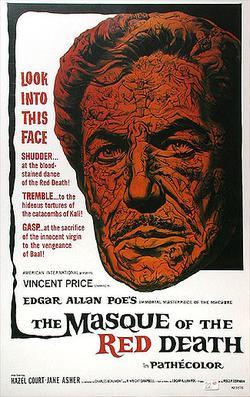At the encouragement of a friend I watched Roger Corman’s version of Poe’s The Masque of the Red Death. As I’ve mentioned from time to time lately, making short fiction into movies requires padding. Poe’s tale is easily summarized: Prince Prospero and his wealthy friends attempt to socially distance themselves during the plague of the red death. During a masquerade, one of the characters is the red death and they all succumb. Getting about 90 minutes out of this was something to which Corman was well suited. The interesting thing, and the reason my friend, I suspect, recommended it, is that Corman did so theologically. Vincent Price’s Prospero is cruel to others to make them face reality. He’s also, and not unrelatedly, a worshipper of Satan.

When the red death breaks out in a small village, Prospero holes up in his castle where he tries to win over a local girl that has caught his attention. He’s drawn to her not only for her beauty, but for her faith. Francesca believes in the goodness of God as strongly as he believes that Satan will welcome him. The film is further padded out by blending it with Poe’s story “Hop-Frog.” Despite the Corman hallmarks of quick production and low budget, this adaptation draws much from conflicting religious views. In fact, this story centers on them. Granted, this was in the sixties, but the ideas still resonate these decades later. Rumors of Satanism still spread panic and spark the same kinds of discussions.
Interestingly, the film ends up suggesting that death is stronger than Satan. And that justice dictates that at least some of the faithful will survive. Those dedicated to their faith, their family, and their friends make it through alive. Death specifically lets them go. Prospero, however, seals his fate by his selfishness. Apparently his explanations of his motives do him no good. Death doesn’t condemn him for his devotion to Satan. The treatment of his fellow humans, it seems, is the ultimate measure used. Some would argue that theology is best left to theologians, but it seems to me that we all work with the same data. Philosophers attempt to convince based on the power of their reason. Theologians try the same, but there’s always something external and unknowable in the equation. How you know this unknown is on the basis of sacred texts and sacred tradition, as well as reason. Why does it seem unlikely that writers and directors might have something to add to the conversation?
